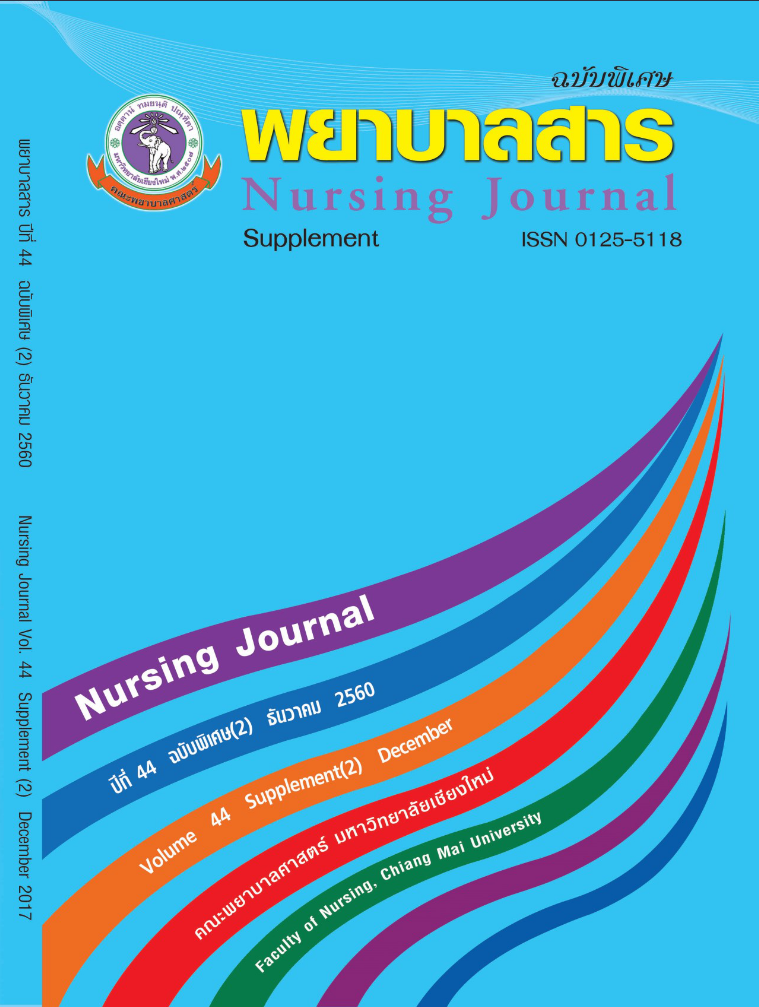Mental Status and Health Promoting Behaviors among Older Persons in Pa-aordonchai Subdistrict Municipality
Keywords:
Mental status, Health promoting behavior, Older personAbstract
Thailand has become an aging society. When the elderly population increases, health problems occur. A mental status examination is a preliminary screening for dementia occurrence which is one of the most common problems among older persons. Due to the dementia occurrence affecting older persons in all aspects and leading to violence in the last phase, these can prevent or delay the violence of dementia occurrence by promoting older persons to have good health promoting behaviors. The purpose of this descriptive study was to investigate mental status, health promoting behaviors, and the relationship between mental status and health promoting behaviors among older persons. Pender’s Health Promotion Model (Pender et al., 2006) was applied to a conceptual framework. One hundred and eleven older persons from Paordonchai Sub-District Municipality were specifically selected to enroll in this study. The data collection instruments composted of a Mini-Mental Status Examination (MMSE)-Thai 2002, and a health promoting behavior questionnaire. Descriptive statistics and Pearson’s product moment correlation coefficient were used for data analysis.
The results showed that:
- All participants had normal mental status without dementia. The scores of MMSE were 18-
28 (x ̅ = 24.22, S.D. = 2.07). - The participants had health promoting behaviors at moderate levels (x ̅= 2.71, S.D. = 0.25).
- The mental status did not correlate with health promoting behaviors (r = -.126, p > .05)
The results of this study can be applied as baseline information for health personnel in planning activities to promote health promoting behaviors among older persons.
References
Neuroscience, 6(3), 16-23.
มูลนิธิสถาบันวิจัยและพัฒนาผู้สูงอายุไทย. (2553). สถานการณ์ผู้สูงอายุไทย พ.ศ.2552. กรุงเทพฯ: บริษัท
ทีคิวพีจำกัด.
วริศา จันทรังสีวรกุล. (2553). พฤติกรรมส่งเสริมสุขภาพและภาวะสุขภาพของผู้สูงอายุที่สถานสงเคราะห์คนชราจังหวัดนครสวรรค์. วารสารวิจัยทางวิทยาศาสตร์สุขภาพ. 2( 2), 12-19.
วันดี โภคะกุล และ จิตนภา วาณิชวโรตน์. (2551). การดูแลผู้ป่วยภาวะสมองเสื่อม สำหรับบุคลากรสาธารณสุข. กรุงเทพฯ: สถาบันเวชศาสตร์ผู้สูงอายุ กรมการแพทย์ กระทรวงสาธารณสุข.
วิชัย เอกพลากร (บรรณาธิการ). (2557). รายงานการสำรวจสุขภาพประชาชนไทยโดยการตรวจร่างกาย ครั้งที่
5 พ.ศ. 2557. กรุงเทพฯ: เดอะ กราฟิกซิสเต็มส์.
ศิรินทร์ทิพย์ คำฟู, กฤษณพนธ์ ชัยมงคล, ชันลิกา ไชยชมภู, และ เพ็ญพิชชา แก้วมุณีวงศ์. (2557).
การคัดกรองภาวะสมองเสื่อมและภาระในการดูแลตนเองในผู้สูงอายุอำเภอแม่จัน จังหวัดเชียงราย.
ศรีนครินทร์เวชสาร. 29(4), 389-393
ศิริมา วงค์แหลมทอง. (2542). ปัจจัยส่วนบุคคล การรับรู้ประโยชน์ของพฤติกรรมส่งเสริมสุขภาพและพฤติกรรมส่งเสริมสุขภาพของผู้สูงอายุ (วิทยานิพนธ์พยาบาลศาสตรมหาบัณฑิต สาขาวิชา
การพยาบาลผู้สูงอายุ). บัณฑิตวิทยาลัย, มหาวิทยาลัยเชียงใหม่.
สถาบันประสาทวิทยา. (2551). แนวทางเวชปฏิบัติภาวะสมองเสื่อม (พิมพ์ครั้งที่ 2). กรุงเทพฯ: ธนาเพรสจำกัด
สถาบันประสาทวิทยา. (2557). แนวทางเวชปฏิบัติภาวะสมองเสื่อม. กรุงเทพฯ: ธนาเพรสจำกัด
สถาบันเวชศาสตร์ผู้สูงอายุ. (2551). การประเมินเทคโนโลยีทางการแพทย์ เรื่องการเปรียบเทียบความสัมพันธ์แบบทดสอบสภาพสมองเสื่อมเบื้องต้น ฉบับภาษาไทย (MMSE-Thai) 2002 และแบบทดสอบสมรรถภาพสมองไทย (Thai Mini-Mental State Examination; TMSE) ในการคัดกรองผู้สูงอายุภาวะสมองเสื่อม. กรุงเทพฯ: บริษัท ซีจี ทูล จำกัด.
สมาคมผู้ดูแลผู้ป่วยสมองเสื่อมแห่งประเทศไทย. (2552). สมองเสื่อม. สืบค้นจาก http://www.azthai.org/filedowload/dementia.pdf
สายสุนีย์ เลิศกระโทก, สุธรรม นันทมงคลชัย, และ ศุภชัย ปิติกุลตัง. (2556). ความชุกของภาวะสมองเสื่อม
และปัจจัยที่สัมพันธ์กับภาวะสมองเสื่อมใน ผู้สูงอายุ ตำบลอรพิมพ์ อำเภอครบุรี จังหวัด นครราชสีมา.
วารสารสาธารณสุขศาสตร์. 43(1), 42-54
สํานักงานปลัดกระทรวงการพัฒนาสังคมและความมั่นคงของมนุษย์. (2557). ประชากรผู้สูงอายุไทย: ปัจจุบันและอนาคต. กรุงเทพฯ: ศูนย์เทคโนโลยีสารสนเทศและการสื่อสาร.
สิรินทร ฉันศิริกาญจน, จิรพร เหล่าธรรมทัศน์, จักรกฤษณ์ สุขยิ่ง, ดาวชมพู นาคะวิโร, อรพิชญา ไกรฤทธิ์,
และคณะ. (2558). สมรรถนะสมองของผู้ใหญ่และผู้สูงอายุไทย: ปัจจั ยเสี่ยงต่อภาวะสมองเสื่อม.
วารสารพิษวิทยาไทย. 30(1), 41-59
อาทิตยา สุวรรณ์ และ สุทธิศรี ตระกูลสิทธิโชค. (2559). ความชุกของภาวะสมองเสื่อมและปัจจัยที่สัมพันธ์กับ
ภาวะสมองเสื่อมในผู้สูงอายุตำบลหลักหก อำเภอเมือง จังหวัดปทุมธานี. สมาคมสถาบันอุดมศึกษา
เอกชนแห่งประเทศไทย. 5(2), 21-32.
Alzheimer’s Disease International. (2014). Nutrition and dementia: A review of available research.
London: Alzheimer’s Disease International.
Benedetti, T. R. B., Borges, L. J., Petroski, E. L., Goncalves, L. H. T. (2008). Physical activity and mental health status among elderly people. Revista de Saúde Pública, 42(2), 2-6.
Beyza, A., Emine, A. T., & Ugur, C. (2013). Factors affecting cognitive function in older adults: A Turkish sample. International Journal of Gerontology, 7(2013), 137-141.
Burns, N., & Grove, S. K. (2009). The practice of nursing research: Appraisal, synthesis, and generation of evidence (6 th ed.). Philadelphia: Elsevier Saunders.
Chamroonsawasdi, K., Phoolphoklang, S., Nanthamongkolchai, S., & Munsawaengsub, C. (2010). Factor Influencing Health Promoting Behaviors among the Elderly Under the Universal Coverage Program, Buriram Province. Thailand. Asia Journal of Public Health, 1(1), 15-19.
Christopher, P., John, F., Angeles, G., & Chris, M. (2007). General risk factors for dementia: A systematic evidence review. Alzheimer’s & Dementia, 3(2007), 341-347.
Eliopoulos, C. (2010). Gerontological nursing (7th ed.). Philadelphia: Lippincott Williums & Wilkins.
Jaiyungyuen, U., Suwonnaroop, N., Priyatruk, P., & Moopayak, K. (2012). Factors influencing health-promoting behaviors of older people with hypertension. 1st Mae Fah Luang University International Conference 2012, 1-9.
Noosorn, N., & Saengngern, S. (2013). Health promoting behaviors among older people living alone with chronic disease in the lower northern region of Thailand. European Scientific, 19(6), 214-226.
Patterson, C., Feightner, J., Garcia, A., & MacKnight, C. (2007). General risk factors for dementia:
A systematic evidence review. Alzheimer's and Dementia, 3(4), 341-347.
Perez, L., Hiem, L., Sherzai, A., Jaceldo-Sieql, K., & Sherzai, A. (2012). Nutrition and vascular dementia. The Journal of Nutrition, Health & Aging, 16(4), 319-324.
Pender, J. N., Murdaugh, L. C., & Parsons, A. M. (2006). Health promotion in nursing practice (5th ed.). New York: Pearson Education.
Polit, D. F., & Beck, C. T. (2004). Nursing Research: Principle and methods (7th ed.). Philadelphia: Lippincott Williams & Wilkins.
Saczynski, J.S., Pfeifer, L. A., Masaki, K., Korf, E.S., Korf, E. S., Laurin, D., et al., (2006). The effect of social engagement on incident dementia: The Honolulu-Asia Aging Study. American Journal of Epidemiology. 163(5), 433-440.
Vivian, P. L., Paulo, C., Antônio, L. T., Maira, T. B., Karoline, C. C., Maria, G. C., et al. (2013).
High cortisol levels are associated with cognitive impairment no-dementia (CIND) and
dementia. Clinica Chimica Acta. 423(2013), 18-22.
World Health Organization. (2017). 10 facts on dementia. Retrieved from
http://www.who.int/features/factfiles/dementia/en/
Downloads
Published
How to Cite
Issue
Section
License
บทความที่ได้รับการตีพิมพ์เป็นลิขสิทธิ์ของวารสารพยาบาลสาร
ข้อความที่ปรากฏในบทความแต่ละเรื่องในวารสารวิชาการเล่มนี้เป็นความคิดเห็นส่วนตัวของผู้เขียนแต่ละท่านไม่เกี่ยวข้องกับมหาวิทยาลัยเชียงใหม่ และคณาจารย์ท่านอื่นๆในมหาวิทยาลัยฯ แต่อย่างใด ความรับผิดชอบองค์ประกอบทั้งหมดของบทความแต่ละเรื่องเป็นของผู้เขียนแต่ละท่าน หากมีความผิดพลาดใด ๆ ผู้เขียนแต่ละท่านจะรับผิดชอบบทความของตนเองแต่ผู้เดียว






